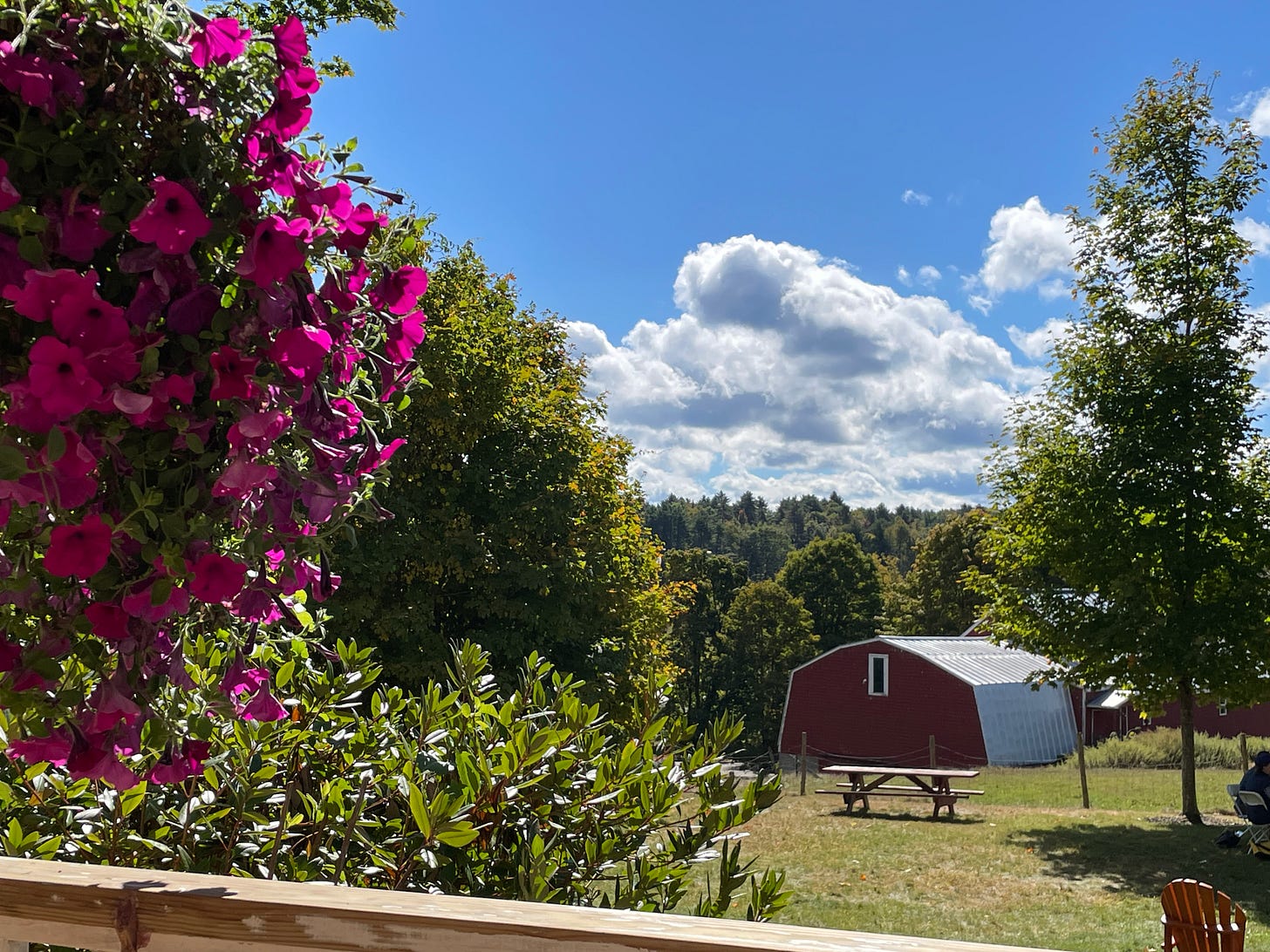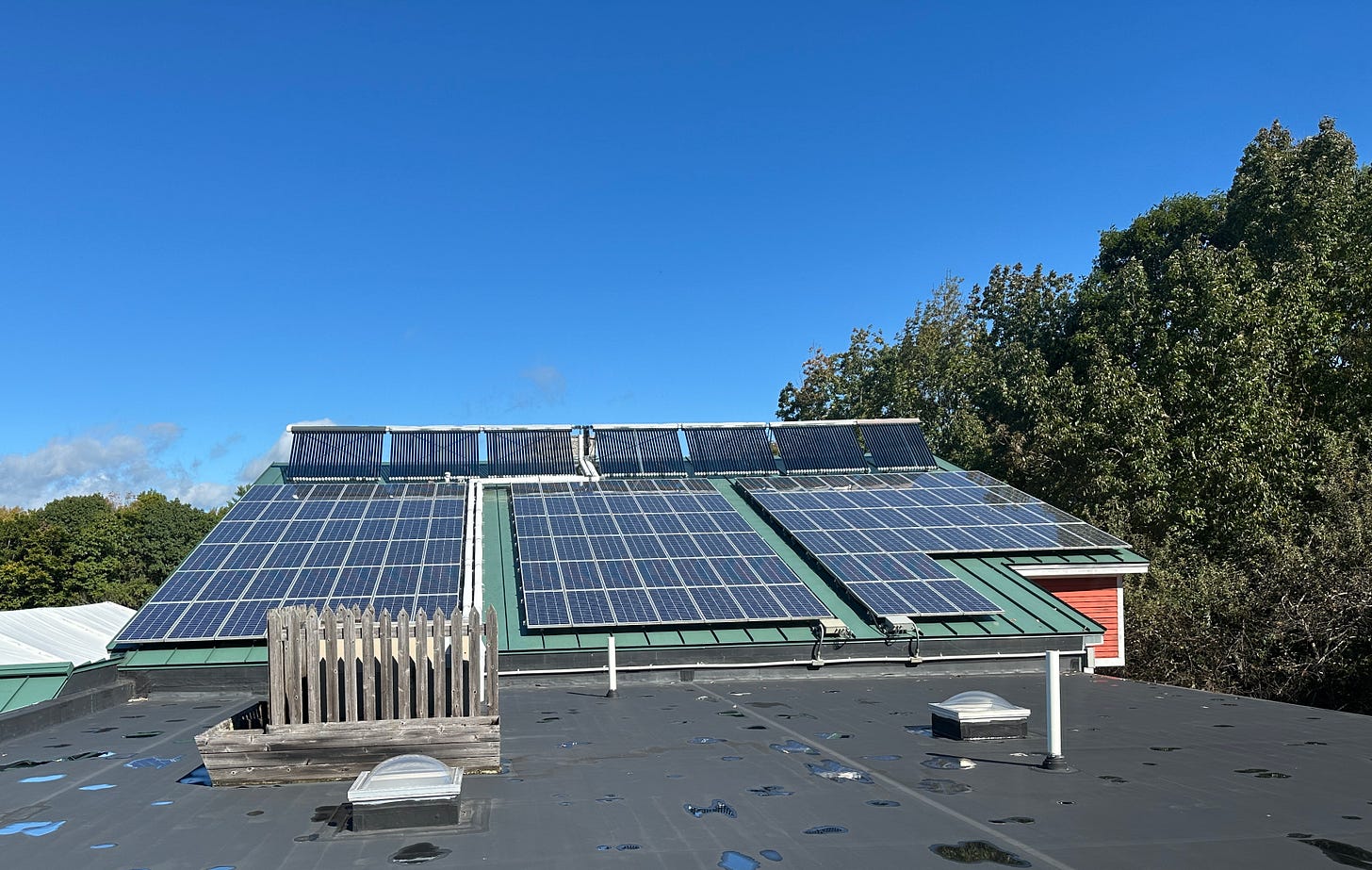I am coming to you today from Maine in a state of happy exhaustion. I’ve just completed two fantastic days at the BTS Center Convocation, a beautifully curated event where I served as the keynote speaker. Since I’ve been retreated away (is “retreated” a transitive verb?) at the lovely Maple Hill Farm in Hallowell, Maine, I won’t be doing my usual news summary bit this week, but I will be sharing some sweet photos and some encouraging reflections on what I learned from a group of lively, impressive people. The newsletter will be back to our usual format next time, on October 12.
Not a bad place to spend a few days, right? The first day, we enjoyed how the farm looks in pouring rain. Then: this glorious blue sky.
This Week in Climate News
You already know what’s happening in the Southeast US this week. If you have been in or near the path of Hurricane Helene, I hope that you are OK. I’m not going to summarize the reporting on the hurricane. I’ll let Heather Cox Richardson do it for me:
Hurricane Helene hit with a 15-foot (4.6 meter) storm surge and left a path of destruction across Florida before moving up into Georgia, North Carolina, South Carolina, Tennessee, Virginia, and Kentucky with torrential rain, flash floods, high winds, and tornadoes. A record level of more than eleven inches of rain fell in Atlanta, Georgia. At least 45 people have died in the path of the storm, and more than 4.5 million homes and businesses across ten states are without power. The roads in western North Carolina are closed. Moody’s Analytics said it expects the storm to leave $15 to $26 billion in property damage.
Officials from NOAA, the scientific and regulatory agency that forecasts weather and monitors conditions in the oceans and skies, predict that record-warm ocean temperatures this year will produce more storms than usual. NOAA hurricane scientist Jeff Masters noted that Helene’s landfall “gives the U.S. a record eight Cat 4 or Cat 5 Atlantic hurricane landfalls in the past eight years (2017–2024), seven of them being continental U.S. landfalls. That’s as many Cat 4 and 5 landfalls as occurred in the prior 57 years.”
I’ve been thinking about how easy it is for us to become so used to extreme weather events now that we hardly pay attention anymore when someone else is dealing with one. I worry about over-normalizing the fear, disruption, hardship, and often heroic adaptability people show amid these extreme events.
I’ve shared this graphic before. Just a reminder. Besides causing all manner of human and environmental suffering, disasters cost money! Source: climate.gov.
Meanwhile, as Richardson writes: “Project 2025 [the Republican playbook] … calls for slashing FEMA’s budget” and “dismantling the National Oceanographic and Atmospheric Administration” because, it says, “NOAA, whose duties include issuing hurricane warnings, is “one of the main drivers of the climate change alarm industry and, as such, is harmful to future U.S. prosperity.” This is just bonkers. Climate impacts don’t go away just because we want to pretend they’re not real. I imagine that climate change hardly feels like a mythical construction of FEMA and the NOAA to the people who have lost their homes and businesses.
Deeper Dive and Refugia Sightings
All the more reason why I’m grateful for the group of beautiful people who welcomed me to the BTS Center’s Convocation these past few days. These are folks who get it. They are willing to face the reality that we live in a crucial historical moment of upheaval, a moment calling for urgent, radical transformation. The convocation gathered a small group, maybe 100 people, mostly New Englanders, mostly Christians, mostly from mainline traditions, with some important exceptions from Jewish, Hindu, and indigenous communities. But we all know, don’t we, that small groups are not insignificant? That’s how refugia spaces work—they are small, humble places where life persists and rebuilds amid severe disruption.
So more than anything else, I want to bring you these encouraging words: Beautiful, creative, faithful people are finding each other, and they are joining their passion and love and brilliance together. Despite everything, please do not despair about “church decline.” I know so much looks bleak in the Christian church. But I am certain that something new and powerful is emerging out of the pain and wreckage. This is the work of the Spirit, and nothing can stop it. As the angel says to Mary in Luke 1, “Nothing will be impossible with God.”
There they are, those beautiful people. They gamely agreed when I asked to take their photo from the podium so I could share their greetings with you.
I was so impressed by the eager engagement of the convocation attendees. Wow! These are incredibly smart, compassionate people. They are a prophetic minority in their larger faith groups. And I was so grateful for their wholehearted engagement with the refugia idea. I had dozens of conversations with folks during our two days:
a hospital chaplain who shared a copy of her sermon with me, which blended quotations from Refugia Faith with an examination of Ephesians 4, encouraging South Freeport UCC to trust God and continue forming a refugia space for the community
a woman who inherited a big house with a big yard in the middle of a small town, surrounded by some problematic neighborhoods. She is now feeling called somehow to turn this place into a refugium.
a pastor finding new energy as she adapts the transformations concepts from Refugia Faith for her congregation for a series.
I want to emphasize that none of this is about me. I definitely feel like a bewildered traveler who somehow stumbled upon this beautiful refugia metaphor and wound up carrying it around and offering it to people. The whole point is for people to take this generative idea and run with it, using their own creativity in their own context. And that’s exactly what these folks are doing. I’m just grateful to be a part of it.
I gave two talks. One was “refugia basics.” The other was more experimental material I’m exploring for the next book, tentatively called Refugia Church. Many of us are wondering: what is the role of churches, congregations, faith groups in this moment of Great Transition. What do we have to offer, not only as individuals, but as faith-based communities?
I know this is a tough question for many reasons, among them the pain so many pastors and congregants are carrying over conflicts and fractures within denominations. I think one of the most important things I learned this weekend is that, perhaps partly because of these fractures, we are creating new paths of connection. These paths cross denominations and even faiths. I hope that we are weaving together a new fabric so that we can discern and offer the gifts of our various faith traditions together.
I’m so grateful to explore what that weaving and offering might mean with the amazing people at the BTS Center. They are the geniuses and catalyzers behind the convocation and behind so much good work equipping thoughtful and effective spiritual leadership for a climate-changed world. I am so pleased to report that the BTS Center staff are as generous, wise, and funny in person as I expected based on our many Zoom encounters. They will continue to partner with me in developing material for this next book. I could not do this without them!
The BTS staff allowed me to join them for a debrief after the first day. They know how to do serious work with joy. L to R, Allison Cornish, Kay Ahmed, Ash Temin, me, Allen Ewing-Merrill.
I could also not do this work without husband Ron, a liturgical theologian and homiletics professor, who is lending his expertise to this next book as well. Happily Ron was able to join me for the weekend, and I’m so glad. We were able to share the tasks of listening diligently and taking a million notes.
When you’re doing difficult work on climate and faith leadership, it’s important to play. So despite being an introvert, I was drawn in by the charm and energy of BTS staffer Madeline Bugeau-Heartt, who expertly led an evening of embodied play. She had BTS staffers perform two little plays—yes, they dragged me into this, too—and she had a whole roomful of attendees telling stories with tableau. I admit: it was super fun.
BTS staffers Ben Yosua-Davis and Allison Cornish gamely wearing sparkly alien antennae for their roles in “Failed Experiment.”
I also want to give a shout-out to the amazing Rev. Mariama White-Hammond, who delivered a banger of an opening sermon for the convocation, a sermon based on Jesus’ parable of the sower and weaving in Octavia Butler’s Parable of the Sower. I’ll share the recording with you when it comes out in a few weeks, but suffice to say Mariama is not afraid to get real about the sober challenges we face—and the God who will not forsake us.
And another brief shout-out to our kind hosts at Maple Hill Farm, an exemplary B&B and conference center. Highly recommend. They steward a beautiful property, and they are working hard to make the farm climate-friendly, with power from a wind turbine and from solar panels, local food sourcing, and so on. I appreciated their complete lack of plastic or paper serving ware. It was real plates and glasses all the way. I was disappointed, however, in the resident llamas, who never did come out to play.
I took a walk in the nearby woods on that first rainy day and went off trail to discover nifty things like these fungi. Thankfully, my phone’s GPS got me back to the farm.
Solar panels visible from the window of my room.
Finally, here’s the wildest thing that happened: a wonderful musician called Joshua Long wrote a song called “Refugia Faith”! I am not kidding. I did not see this coming, but wow! Josh was our convocation musician, leading us in singing and renewing our flagging energy. Josh is a nice guy and a total pro at his job. He is a prolific writer of climate-related songs, and you can find out more about him at his website. Start there and you can find all his accounts on TikTok, Instagram, YouTube, and Facebook. He has a new album out called We Are Earth.
So just for you, with Josh’s permission, behold the world premier of Josh’s brand-new song, “Refugia Faith”!
Ron, Josh, and me, with a book of Josh’s music.
Well, it’s time to head back home to Michigan, rest, and reflect. Just kidding. I’ll go right back to the office on Monday and dive back into the semester’s teaching. But I come away with a sense of awe: I feel as if I have been in the presence of Spirit-led change. It’s not easy. We don’t know the way ahead exactly. But that’s OK. God is among us. We need to find each other and hang on as we go along for the ride.
Elmer, one of Maple Hill’s resident kitties modeling healthy rest. Elmer spent a whole afternoon napping in this spot. Time for some naps for me, too.
Thanks for reading. Until next time, be well.













Love the new song by Joshua Long! ❤️🔥